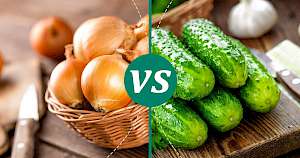Cucumber vs Onion: Nutrition & Calories Compare


Cucumber vs Onion
Nutrition Facts
Serving size:
change
5g10g15g20g30g40g50g60g80g100g120g140g160g180g200g220g250g300g350g400g450g500g600g700g800g900g1000g
1oz2oz3oz4oz5oz6oz7oz8oz10oz12oz15oz20oz25oz30oz35oz40oz50oz
Amount Per Serving:
Serving size:
change
5g10g15g20g30g40g50g60g80g100g120g140g160g180g200g220g250g300g350g400g450g500g600g700g800g900g1000g
1oz2oz3oz4oz5oz6oz7oz8oz10oz12oz15oz20oz25oz30oz35oz40oz50oz
Amount Per Serving:
Cucumber vs Onion 100g Compare
| per 100g | Cucumber | Onion |
|---|---|---|
| Calories | 15 | 40 |
| Carbohydrates | 3.63 g | 9.34 g |
| Fat | 0.11 g | 0.1 g |
| Dietary fiber | 0.5 g | 1.7 g |
| Protein | 0.65 g | 1.1 g |
| Calcium | 16 mg | 23 mg |
| Iron | 0.28 mg | 0.21 mg |
| Magnessium | 13 mg | 10 mg |
| Potassium | 147 mg | 146 mg |
| Sodium | 2 mg | 4 mg |
| Vitaminium A | 105 µg | 2 µg |
| Vitaminium B1 (Thiamine) | 0.027 mg | 0.046 mg |
| Vitaminium B2 (riboflavin) | 0.033 mg | 0.027 mg |
| Vitaminium B3 (Niacin) | 0.098 mg | 0.116 mg |
| Vitaminium B5 | 0.259 mg | 0.123 mg |
| Vitaminium B6 | 0.04 mg | 0.12 mg |
| Vitaminium B9 (Folic acid) | 7 mg | 0.019 mg |
| Vitaminium C | 2.8 mg | 7.4 mg |
| Vitaminium E | 0.03 mg | 0.02 mg |
| Beta karoten | 45 mg | 1 mg |
Discovering the Nutritional Profiles of Cucumbers and Onions
When it comes to adding flavor and crunch to our dishes, cucumbers and onions are often our go-to ingredients. Beyond their unique tastes and textures, these vegetables hold fascinating nutritional profiles that might surprise you. Before diving into the specifics of cucumber vs onion nutrition, let's explore some interesting facts about these common kitchen staples.
Refreshing Cucumbers
Cucumbers, with their crisp texture and refreshing taste, are primarily made up of water, making them incredibly hydrating. They belong to the same plant family as melons and squash. Beyond their high water content, cucumbers are also known for their low calorie count, making them a popular choice for those looking to maintain a healthy diet.
Flavorful Onions
Onions, on the other hand, are celebrated for their strong flavor, which can range from sweet to spicy depending on the variety. They have been a staple in cooking for thousands of years, valued both for their culinary versatility and medicinal properties. Onions are richer in certain nutrients compared to cucumbers, including fiber and vitamin C.
Comparing Nutritional Values
When it comes to choosing between cucumbers and onions, it might help to look at their nutritional content more closely. Here's a comparison based on a standard serving size:
- Calories: Cucumber has 15 calories per serving, while onions have 40 calories. This makes cucumbers a more calorie-friendly option.
- Carbohydrates: Onions contain more carbohydrates, with 9.34g per serving, compared to cucumbers, which have 3.63g.
- Fiber: Onions also lead in fiber content with 1.7g, offering more than the 0.5g found in cucumbers.
- Vitamins and Minerals: Both vegetables offer a range of vitamins and minerals, but they excel in different areas. Cucumbers are a good source of vitamin K and potassium, whereas onions provide a higher amount of vitamin C and dietary fiber.
What About the Taste and Usage?
Aside from their nutritional differences, cucumbers and onions serve distinct purposes in cooking. Cucumbers are often used raw, adding a fresh, crisp element to salads and sandwiches. Onions, with their potent flavor, are a foundational ingredient in many cooked dishes, offering depth and aroma that enhances the overall taste.
Conclusion
Both cucumbers and onions have their unique nutritional benefits and culinary uses. Whether you're looking for a low-calorie option to add to your salad or a flavorful addition to your cooking, understanding their nutritional profiles can help you make informed choices based on your dietary needs and preferences. Ultimately, incorporating a variety of vegetables into your diet is key to achieving a balanced and healthy lifestyle.
Cucumber 100g
15kcalCalories source
- 80% CARBS.
- 14% PROTEIN
- 5% FAT
Onion 100g
40kcalCalories source
- 88% CARBS
- 10% PROTEIN
- 2% FAT
Compares of cucumber
- Cucumber vs Artichoke
- Cucumber vs Arugula
- Cucumber vs Asparagus
- Cucumber vs Beetroot
- Cucumber vs Pepper
- Cucumber vs Bok Choy
- see all compares of cucumber
Marcin Piotrowicz
calories-info.com creator
Healthy diet and healthy lifestyle promoter
Add comment